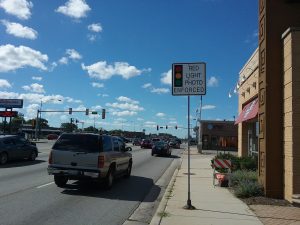‘Embarrassing’ camera program gives money back to violators
By Kevin Beese For Chronicle Media — August 8, 2017
Motorists approach the intersection of Archer and Central avenues in Chicago. The intersection is part of the city’s red-light camera program, which will pay out $39 million for not providing violators with proper due process. (Photo by Kevin Beese/For Chronicle Media)
A “flawed” red-light camera system will cost Chicago — to the tune of $39 million.
The city has agreed to return $39 million in red-light camera fines.
A total of 1.2 million motorists will be offered 50 percent refunds because they were denied due process, according to the settlement of a class action suit brought against the city cameras.
The city failed to send violators a required second notice of violation and imposed $100 late fees four days before they were supposed to, according to the lawsuit.
Ald. Edward Burke (14th Ward), a longtime opponent of the cameras and the camera company, Redflex Traffic System, said no one paid attention to obvious problems with the red-light system that did not require competitive bidding.
“You know what? Stevie Wonder could see that there is something rotten in this program,” Burke said before the City Council approved the settlement last week.
Ald. Anthony Beale (9th) said that while attorneys for the plaintiffs in the case will walk away with $11.7 million, motorists entitled to the money could be earning “a whopping $7,” if all eligible individuals apply for their cut.
“Now if the county has their way, that $7 might get you a 2-liter,” Beale joked of the penny-per-ounce tax Cook County passed for sweetened beverages.
Burke said that in a typical class-action case about 25 percent of eligible individuals apply for the money. In that scenario, he said, people with violations would get a $42 refund.
Three individuals, including a longtime City Hall insider, have been convicted in connection with bribes being provided for Redflex getting the city camera contract.
Burke said that Redflex should not be considered for any future city business.
“It is an absolute disgrace for the city of Chicago to permit Redflex that has been guilty of this kind of reprehensible illegal conduct to be an authorized city vendor and we ought to take the next step or we will be back here again with some other lawyer,” Burke said.
Beale said by having to dole out the settlement payout, other projects in the city will suffer.
“By the system being flawed, it’s costing the city of Chicago almost $39 million,” Beale said. “Now, we all have different projects in our wards that we are fighting for resources for, but something has to suffer to pay out $39 million.”
Beale said that he was perturbed with how the issue played out. He said the cameras should be used only in areas where there are a lot of crashes.
He pointed out that most of the red-light tickets, however, are issued in the “black and brown community.”
“The people who could least afford to pay these tickets are the ones being hit,” Beale said. “So the blood-sucking attorneys found a way to use once again the people who can least afford to pay, used them to get $11 million, cash their check and are going to hand you a check for $7 and say, ‘Thank you very much. Have a nice day.’”
Beale and Burke both referred to the city’s red-light camera program as “embarrassing.”
Ursula Phoenix, secretary of the Parish Council at St. Sabina Church, a Chicago congregation active in social justice, said the cameras “are a wrong deal” for people in the city.
“The red-light cameras should be completely abolished,” she said. “… Continue to knock down and vote down this egregious mistake. We do not want our children to inherit this ridiculousness. It is not right. Chicago is better than that.
“It is true that mistakes are made, but opportunity to correct the mistakes is to abolish the red light cameras.”
Mark Wallace, a member of Citizens to Abolish Red Light Cameras, said the City Council should draft a resolution to fundamentally end the program of red-light cameras and speed cameras.
He said as a result of the corrupt scheme to put the cameras in place, “the city of Chicago has the dubious honor of having the largest photo enforcement of red light cameras and speed cameras in the United States of America.”
“This is not the way that government should be operating,” he said.
Wallace said by putting the second notice back into the red-light camera ordinance it allows for poor people to have the opportunity to pay tickets without fines doubling to $200.
He said the red light camera ordinance is “a punitive policy that does not provide the safety benefits that we all want and need here in the city of Chicago.”
Free subscription to the digital edition of the Cook County Chronicle
Read the current issue of the Cook County Chronicle
— ‘Embarrassing’ camera program gives money back to violators —







